2013: Telecom & Politics Collide
By: Becky Bracken

Two thousand thirteen was arguably one of the most politically charged years in recent memory for the telecommunications industry. Accusations were hurled across oceans between the largest nations in the world, hearings were gaveled into order and the digital equivalent of news ink was spilled by the bathtubful detailing the ferocious intersection of telecom and government. And there doesn't seem to be any end sight.
From net neutrality to government-sponsored spying, the politics of telecom go far beyond the basic lobbyist’s wine-and-dine act to influence policymaking. Telecom and its accompanying legislation and regulation are changing the way people view communications technology, its role in society and the impact on everyday folks when it’s misused and commandeered by outside forces. Telecom companies have never been in a more powerful position and where there is power politics is the unfortunate yet inevitable byproduct.
Net neutrality
Net neutrality, the idea that network operators should transport all traffic equally, is in jeopardy in the United States much to the chagrin of open-internet activists everywhere. The U.S. Court of Appeals for the District of Columbia Circuit sits poised to strike down the Federal Communications Commission’s 2010 rules enforcing a neutral internet. Communications service providers (CSPs) such as Verizon, which has taken the FCC to court, say the regulatory agency has no constitutional authority to make rules governing the internet, but FCC overreach isn’t the only issue. Verizon also argues that the rules go too far in mandating that CSPs use their assets without regard to competitive and market-based pressures, resulting in a standoff between the FCC’s interest in maintaining control of internet regulation and capital market forces.
“The Order imposes classic common-carrier obligations on broadband providers, requiring them to carry the traffic of all ‘edge providers’ and even wading into price controls by setting a uniform, nondiscriminatory price of zero for such carriage,” Verizon wrote in its brief filed with the D.C. Circuit. “This regulation of Internet access service is expressly prohibited by [the Telecommunications Act of 1996].”Further clouding this legalese is the reality that over-the-top (OTT) players are making a killing off the pipes that CSPs are supplying—and are currently mandated to supply—without discrimination. Last month network solutions provider Sandvine released a report showing that Netflix and YouTube are responsible for half of all North American fixed-line traffic traversing CSPs’ networks, yet the FCC’s rules dictate that CSPs must carry that traffic without regard to the idea that these OTT services are racking up profits on their dime.
Watchdogs and net-neutrality activists sense a slippery slope: if CSPs are allowed to prioritize certain kinds of traffic, what’s to keep them from providing carriage for certain types of speech—political propaganda, for example—or blocking innovators working on competing technologies and business models? A world in which the depth of one’s pockets can determine the extent of someone else’s internet access would be a stifling and frightening one indeed.
According to reporting from Bloomberg BNA in September on oral arguments in Verizon’s case against the FCC, judges David Tatel and Laurence Silberman could have indicated how they were leaning when they asked tough questions (Judith Rogers was the third member of the three-judge panel), leading industry analysts to believe the net-neutrality rules would be struck down, thus opening the door for CSPs to charge a premium for carrying certain kinds of traffic.
“The telcos have been pulling out all the stops to get a ‘piece of the action’ from net commerce,” telecommunications consultant Ray W. Nettleton told Pipeline. “They want to charge players like Google a toll fee for using their networks. If the D.C. Circuit court rules in their favor, net neutrality will be a thing of the past—they who pay for more bandwidth will have a better customer experience. Most of us down in the trenches are hoping it won’t happen, but I’m not a prognosticator.”





















